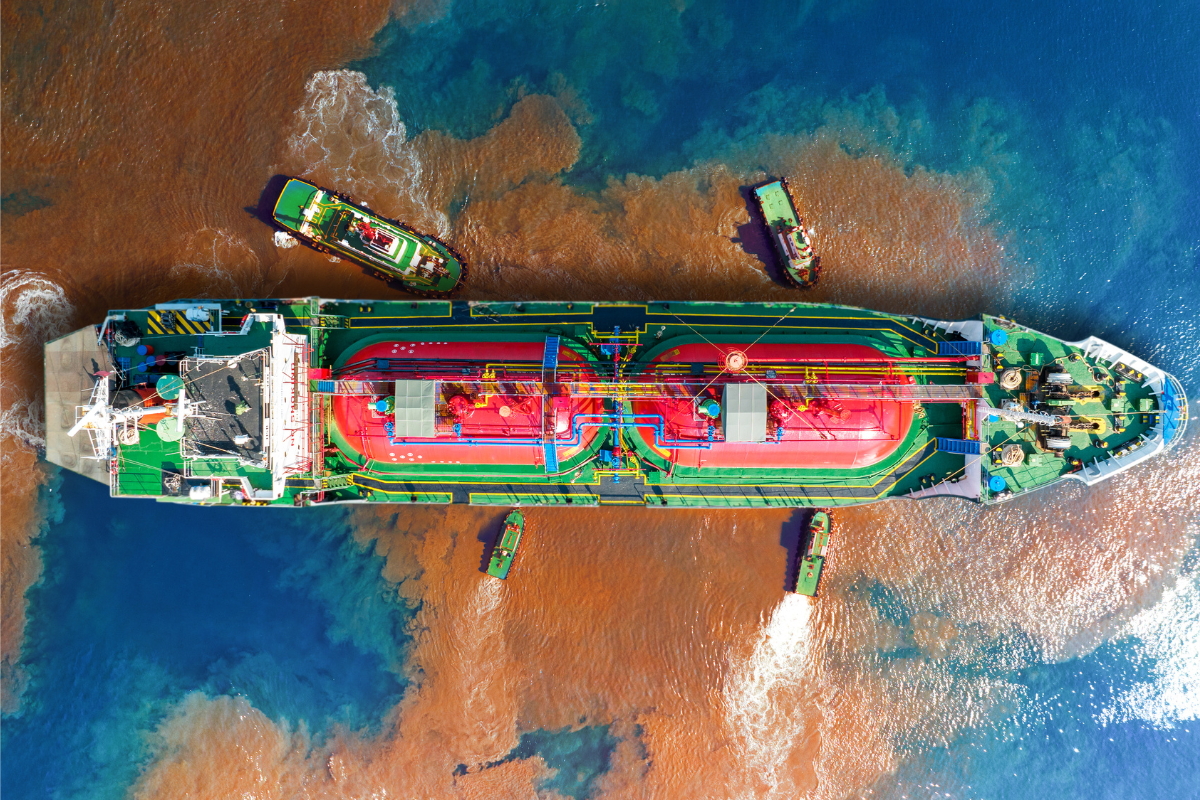Spills at sea represent one of the most serious environmental disasters threatening marine and coastal ecosystems worldwide. They can result from accidents on oil platforms, from oil tankers or from ship exhaust pipes, and have devastating consequences on the marine environment, but also on the local economy and human health.
- Impacts of the oil spill
- Other types of spills at sea
- Challenges and solutions in preventing spills at sea
Impacts of the oil spill
A recent episode of spills into the sea involved a mysterious oil spill off the coast of Tobago, Caribbean, which occurred in February 2024, when a stranded ship released a vast amount of oil, severely damaging pristine beaches and coral reefs.
The Prime Minister of Trinidad and Tobago has declared a state of national emergency. Hundreds of volunteers are mobilising to remove the oil from the coast and to save fish, seabirds and other wild creatures.
Oil spills at sea have a destructive impact on many aspects of the marine environment. Oil contamination severely damages marine habitats, killing or harming plants and animals and compromising the food chain.
Beaches and coastal areas affected by oil spills suffer irreparable damage. Oil that is deposited on the coast can persist for years. Oil dispersed in water can accumulate in marine sediments, persist in ecosystems and continue to harm marine life even after the initial incident has been resolved.
These accidents not only have a devastating environmental impact, but also entail enormous economic costs for clean-up, restoration of damaged ecosystems and loss of revenue from tourism and fishing. People are exposed to oil and its derivatives through contaminated water, eating polluted fish or inhaling toxic vapours.
Specifically, oil penetrates the birds’ plumage, reducing its thermal insulating capacity and making the feathers unsuitable for swimming and flying. The birds’ instinct is to clean their plumage with their beaks, but in doing so they ingest oil with obvious harmful effects.
Oil reduces the photosynthetic capacity of marine microorganisms that produce much of the earth’s oxygen, thus contributing to climate change.
Other types of spills into the sea
It is important to note that there are numerous types of spills, each with its own peculiarities in terms of environmental damage and necessary action. The substances involved can vary widely, including industrial solvents, toxic chemicals and industrial waste, among others.
So-called chemicals can impair water quality and put marine and human life at risk. The presence of these substances can alter aquatic and coastal ecosystems, damaging marine habitats, including corals, mangroves and seagrass beds. Chemical pollution can disrupt the marine food chain, causing ecological imbalances and reduced biological productivity. Ingestion of contaminated fish or direct exposure to chemicals can cause respiratory, nervous and reproductive diseases and disorders.
Spills of plastic represent one of the most widespread forms of marine pollution, damaging critical habitats for marine wildlife and reducing the aesthetic and recreational value of coastal areas. Marine animals can become trapped in plastic waste or accidentally ingest it, causing death or damage to health. Furthermore, microplastics can enter the marine food chain.
Solid waste, including wood, metal, glass and household waste, as well as untreated wastewater, contain a wide range of contaminants, including bacteria, heavy metals and harmful chemicals.
Moreover, spills of radioactive materials can have devastating long-term effects, compromising the biodiversity and stability of marine ecosystems.
Challenges and solutions in preventing spills at sea
The Goal 14 of the SDGs aims to prevent and conserve the oceans, seas and marine resources, which are fundamental to the health and preservation of the planet.
The European Union has reached an agreement crucial in Brussels on 15 February to strengthen the prevention of spills at sea through satellite monitoring, marking a significant step in the protection of European marine ecosystems.
Countries can help limit such spills through the adoption of effective policies, the creation of marine protected areas and the training of specialised personnel to manage such events. In addition, they can impose a limit of 90 per cent filling of ships’ fuel tanks.
Shipowners, for their part, can take a number of preventive measures including:
- careful planning of the bunker;
- the formation of trained teams;
- the use of oil absorbent mats in the bilges of all boats with internal engines;
- regular inspection of water intakes and recycling of used oil and filters.
Citizens can also do something to limit the risk of spills at sea by supporting non-governmental organisations through donations or direct involvement. In addition, they can limit the consumption of petroleum-based products and encourage the use of renewable energy sources and biodegradable materials.
In conclusion, a multidimensional approach is needed, i.e. a combination of individual, community and governmental actions to safeguard the marine environment and its biodiversity from spills at sea.
Play for the planet!
